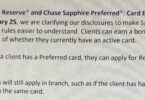Citi has a rule that you can’t get a signup bonus on a card if you opened or closed that card (or any card in that family) within the past 24 months. Reader sdsearch picked up on a small change in the language of the terms. The change wouldn’t be on any normal person’s radar, but for hobbyists who like clarifying the terms minutiae, it’s interesting to note – see below for implications of the change.
Old Terms:
Bonus ThankYou points are not available if you have had ThankYou Preferred, ThankYou Premier or Citi Prestige cards opened or closed in the past 24 months.
New Terms:
Bonus ThankYou Points are not available if you received a new cardmember bonus for Citi Rewards+℠, Citi ThankYou®Preferred, Citi ThankYou® Premier/Citi Premier℠ or Citi Prestige®, or if you have closed any of these cards, in the past 24 months.
The new language has been there for at least a month, though I never picked up on it until reader sdsearch sent this in today. I’m going to guess that they changed the verbiage when they added ThankYou Rewards+ to the language. That card was launched in January. (My searches on Way Back Machine didn’t yield any good results since I can’t find any signup bonuses in the pages saved there.)
On other Citi cards, like the American Airlines card, it still shows the old language:
50,000 American Airlines AAdvantage® bonus miles can be earned by new Citi® / AAdvantage® Platinum Select® card cardmembers approved through this offer. American Airlines AAdvantage®bonus miles are not available if you have had any Citi® / AAdvantage® card (other than a MileUp℠ or CitiBusiness® / AAdvantage® card) opened or closed in the past 24 months.”
Implications
- Negative: The biggest implication is that you have to wait 24 months from the date you received the bonus, not the date the card was open. Essentially, the 24 month rule is now a 25 or 26 or 27 month rule since you usually get the bonus 1-3 months after signing up. Note: I’m not convinced that the internal Citi system actually changed their coding to deny you the bonus in such a scenario – my gut feeling is that the system will still count the 24 months from date of opening. Even if that’s confirmed, personally, I’ll still wait the extra few months to fulfill the technical language of the terms in case there’s an issue with the bonus and I’m at the mercy of a human.
- Positive: If you didn’t get a bonus on a card, that does not reset your clock. In the post Can you get a Signup Bonus if you Previously had the Card without a Bonus? we couldn’t find any data points, but noted that based on the language of the terms, you are ineligible for a bonus even if you didn’t get the bonus the first time, being that it depends on card opening. Going forward, ThankYou cards with the new terms should be eligible if you didn’t get the bonus the first time. (It’s quite possible that’s how it always was in the internal system, but now we have the language suggesting that as well.)
- Positive: Conversions into a given card family should no longer reset the clock. For example, if you product change a Citi Dividend card to become a Rewards+ card (a card which is part of the ThankYou family), that should not reset your ThankYou 24 month clock since you did not “receive a new cardmember bonus” or “close” a ThankYou card. Note: it very well may reset your Dividend 24 month clock (in the hypothetical world that there was such a thing) since changing over the product may be considered “closing” the Dividend card.
- Positive: You may be able to open multiple ThankYou cards at once and get the bonus on all of them since you haven’t “received a new cardmember bonus” or “closed” a ThankYou card within 24 months. See discussion here.
My personal guess here is that they made this change when adding the Rewards+ card into the ThankYou lineup because they wanted people to product change to the card (sources indicate that they are pushing product changes to this card) without having to affect their 24 month status. As such, I’m unconvinced the negative change state above will actually materialize, but in any case, the technical terms imply that way.
Thanks again to reader sdsearch for sending this in.







